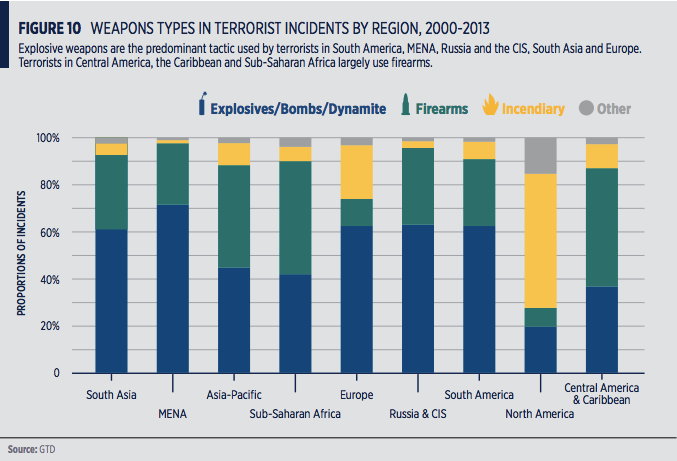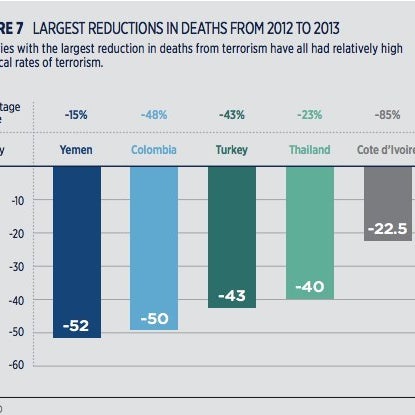On Tuesday, the Institute for Economics and Peace launched the 2013 version of their Global Terrorism Index.
Drawing from data from National Consortium for the Study of Terrorism and Responses to Terrorism (START), based at the University of Maryland, the second annual version of the report "ranks countries according the impact of terrorist activities as well as analysing the economic and social dimensions associated with terrorism."
While some of the findings match those in the State Department's annual Country Reports on Terrorism — which makes sense because both use START's Global Terrorism Database — the Global Terrorism Index separates out state-sponsored terrorist attacks and focus on sub-state actors. That being said there are definitely a few things that are worth noting from this report.
1. The total number of terrorist attacks worldwide increased 61% from 2012 to 2013.

In 2013 terrorist activity increased substantially with the total number of deaths rising from 11,133 in 2012 to 17,958 in 2013, a 61 per cent increase. Over the same period, the number of countries that experienced more than 50 deaths rose from 15 to 24. This highlights that not only is the intensity of terrorism increasing, its breadth is increasing as well.
2. More than 80% of the casualties of terrorist attacks in 2013 occurred in only five countries — Iraq, Afghanistan, Pakistan, Nigeria, and Syria.

3. Sixty-six percent of the claimed deaths from terrorist attacks last year were carried out by only four terrorist groups: ISIS, Boko Haram, the Taliban, and al-Qaeda and its affiliates.

4. Though the four deadliest groups follow a radical version of Islam, not all major terrorist actors are Muslims.

For example, the report notes that "Communist terrorist groups are by far the most frequent perpetrators and the main cause of deaths in India. Three Maoist communist groups claimed responsibility for 192 deaths in 2013, which was nearly half of all deaths from terrorism in India."
5. In fact, until 2002 national seperatism was the primary cause of terrorist attacks. Since 2006, religion as a motivator has jumped substantially.

6. North America's terrorists are at odds with their counterparts around the world, preferring to use incendiary weapons over firearms or explosives.

7. According to the Index, Iraq was far and away the country most affected by terrorism last year.

Rounding out the top 10 countries most affected by terrorism according to the Index: Afghanistan, Pakistan, Nigeria, Syria, India, Somalia, Yemen, the Philippines, and Thailand.
8. The number of deaths due to terrorism skyrocketed in Iraq, but some countries did show less dramatic reductions.


9. Despite claiming to fight against governments or foreign agents, terrorists have consistently chosen private citizens and property as the most frequent target of their attacks.

10. Being poor actually has little to do with why people turn to terrorism.

Importantly, poverty and many other economic factors have little explanatory power on the onset of terrorism. This includes several broader development factors such as mean years of schooling and life expectancy. This underpins the fact that weak political systems, a lack of political legitimacy and the presence of state-sponsored violence are more influential for explaining the rise of terrorist organisations than the broader economic environment.
11. Military action has rarely ever eliminated a terrorist group.

The two most successful strategies for ending terrorist groups since the late 1960s have been either policing or the initiation of a political process. These strategies were the main reason for the ending of over 80 per cent of terrorist organisations that ceased operation. Only ten per cent of terrorist groups could be said to have achieved their goals and only seven per cent were eliminated by full military engagement.
